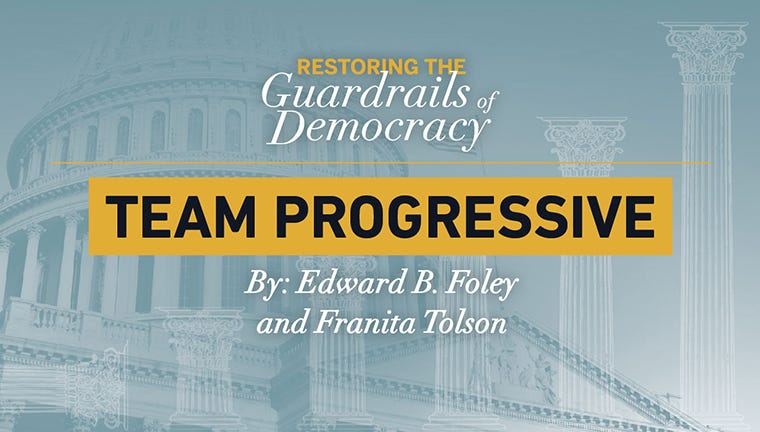Restoring the Guardrails of Democracy
Professor Ned Foley offers Team Progressive's suggestions for electoral reform
This week I continue my series on the National Constitution Center’s Restoring the Guardrails of Democracy project. While most commentators are glued to the political horse race – obsessing over the 2024 midterms or the latest twist in the Trump saga – my show remains a place to discuss ideas and principles rather then ideology and personalities.
Part 1 featured Ilya Somin representing Team Libertarian, who proposed foot voting (among other things) as a simple way to make American government more accountable to the people.
Part 2 will feature Professor Edward B. Foley – Ebersold Chair in Constitutional Law at Ohio State University – presenting the progressive team’s ideas for safeguarding our democracy. Their report is worth reading in its entirety, regardless of your political persuasion. Foley and his co-author, USC law professor Franita Tolson, make a compelling case for reforming the way we elect our representatives to ensure that they actually represent the will of the majority. What a concept!
While Foley is on the record saying he’d like to replace the Electoral College with a national popular vote, the report takes a more modest aim of electoral reform – looking only to what Congress could accomplish through mere legislation, short of a constitutional amendment.
Foley is particularly concerned with electoral procedures that allow more extreme minority factions to hold power. We’ve recently seen primaries in which the Democratic Party funds a far-right candidate who they believe will be easier to defeat in the general election. Foley criticizes this cynical ploy in part because it undermines the selection of “Condorcet Winners.” If you’re unfamiliar with the Condorcet method, pioneered by the Marquis de Condorcet, be sure to tune in live this Sunday.
The basic idea, summarized in Team Progressive’s report, is that the winner of an election should be the candidate “preferred by a majority of voters when compared individually against each of the other alternatives.”
One way to achieve this is through ranked-choice voting, which we recently saw in an Alaskan primary in which Sarah Palin advanced to the general. Dr. Robert Malone offers a valuable explainer on how ranked choice voting works on his Substack.
Join Ned and me this Sunday at 8am PACIFIC, or subscribe to the podcast, to expand your civic numeracy:
In Other News
Tyler Cowen’s latest article in Bloomberg takes the IRS to task for not innovating more efficient methods of tax collection that would require fewer employees. The private sector has managed to use software to operate with leaner staffs. Why can’t the IRS?
What you need to know about the ‘Inflation Reduction Act’
When voters complain of rising prices for the stuff they buy, the economist’s advice to the government is usually to slow down the printing of money and tighten the spending belt. Veronique de Rugy catches Nobel laureate economist Michael Spence claiming that spending an additional $1 trillion will somehow help with our inflation woes through “long-term investment in America's growth potential.”
However, the Inflation Reduction Act only reduces the deficit by $300 billion and accomplishes that through growth-suppressing tax increases. Meanwhile, it skirts the real long-term debt problem of entitlement spending, as Eric Boehm reports in this 2-minute video for Reason.
Dr. Deane Waldman takes a magnifying glass to the Medicare and Medicaid provisions of the Act in the American Thinker. Waldman notes the self-contradictory title of the bill, which will increase inflation as it expands health care entitlements in the form of insurance subsidies.




